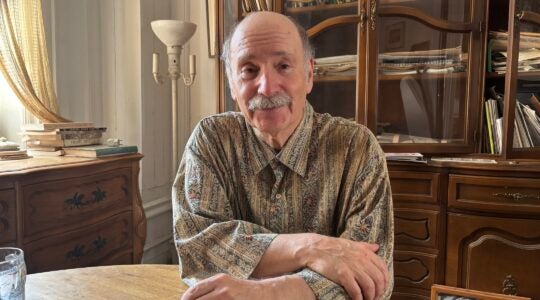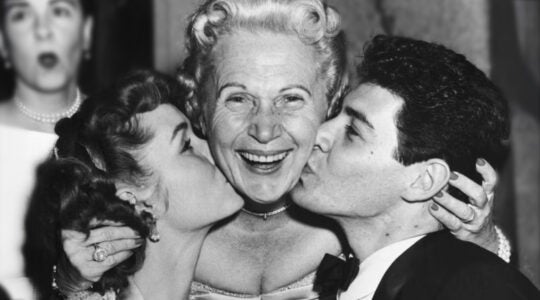More than one person attending the recent open house at The Bridge, a new center in Midwood, Brooklyn, devoted to promoting diversity, marveled at what they saw that night.
Members of the borough’s Orthodox-Jewish, black and Muslim communities cross paths every day, but rarely do they come together to celebrate what they have in common, as about 300 did Oct. 19 for the opening of The Bridge.
The gathering included elected officials, political activists and religious leaders from all three communities, some of whom spoke at the event and two of whom were honored. And toward the end of the evening, a good number of guests danced the hora, as the Caribbean band hired for the event teamed with an Orthodox singer and played “Hava Nagila.”
The center, the full name of which is The Bridge Multicultural and Advocacy Project, is the vision of Mark Meyer Appel, a 62-year-old social activist who owns the building, along with neighboring properties on Flatbush Avenue. His idea for the center, he told the gathering, is to bring together diverse elements of the community through art shows, music and dance concerts, and advocacy efforts around issues affecting Brooklyn.
But Appel is doing so at what seems like an especially tense time, marked by a rash of violent incidents. The incidents have included so-called “knockout” attacks by gangs of black teens who, according to reports, have targeted Jews in Crown Heights, reminding some residents of the riots 23 years ago. The latest such attack took place Oct. 12, when teens rushed into a kosher deli, ransacked the store and shouted anti-Semitic slogans as one of them punched the owner in the jaw, newspaper accounts said.
Only days earlier, pro-Palestinian protesters allegedly attacked Leonard Petlakh, executive director of the Kings Bay Y, following an exhibition basketball game between the Brooklyn Nets and Maccabi Tel Aviv at the Barclays Center. Police have arrested a suspect in that incident, but say they won’t charge him with a hate crime because they don’t believe bias was involved.
Some of the speakers at The Bridge, including Brooklyn District Attorney Kenneth Thompson, alluded to those incidents, promising that any hate crimes would be investigated and vigorously prosecuted. But the speeches also emphasized the positive, focusing on the value of efforts like The Bridge.
“There’s no greater cause than allowing people to gather together under one roof and share our similarities,” said Ezra Friedlander, a political consultant active in the chasidic community and Democratic politics. Friedlander was honored at the event, along with Ed Powell, a local political leader and an assistant imam at one of Brooklyn’s largest mosques.
Other speakers included New York City Public Advocate Letitia James, Assemblywoman Rhoda S. Jacobs, Brooklyn Assemblyman Dov Hikind and City Councilman Jumaane D. Williams, all Democrats. Religious leaders addressing the event include Rabbi Joseph Potasknik, executive vice president of the New York Board of Rabbis, who said that, ultimately, the center is about “making a better life for all of us.”
In interviews before and after the speeches, various leaders of the Jewish community described their admiration for The Bridge’s founder, who is in the process of moving back to Brooklyn after several years in Florida. Rabbi Postasnik called Appel a “bridge builder,” one of the things that attracted him to the event, he said. Similarly, Bob Kaplan, director of intergroup relations and community concerns at the Jewish Community Relations Council of New York, said Appel “has always been there” whenever tensions in the city have escalated.
“He’s always been someone who believes that diversity is a value, not just something to be managed,” Kaplan added.
If the presence of Kathyann Clarke was any indication, The Bridge is already benefiting Midwood residents. Clarke, an accountant, said she learned of the event only a day earlier, when she rented out space at the two-story center for her daughter’s fifth birthday party. She had never heard of The Bridge before, but she spoke briefly with Appel and believes that “what he’s trying to do is important.”
Appel, who grew up in Crown Heights and Boro Park, has ambitious plans for The Bridge, where he hopes to build a computer lab, gallery space and a TV studio. The studio may be used to livestream cultural events and discussions on the Internet. In addition, he said, local charities and arts groups will be able to use space in the 6,000-square-foot center free of charge for their own events.
Appel told The Jewish Week that he first learned about diversity while hearing of his mother’s rescue at Auschwitz, where the soldiers who helped her survive included black and Asian Americans.
Appel worked for many years for nonprofit organizations, but made most of his money from real-estate investments, he said. He’s also played an active role in advocacy efforts, especially those geared to helping abused children and developmentally disabled children. That background earned him appointments during the Giuliani administration to the advisory board of the city’s Department of Mental Health and, later, to the city’s Health and Hospitals Corporation.
The Bridge now has a staff of one, Dorinda Angelucci, who previously worked as a camerawoman for WABC-TV’s “Eyewitness News.”
Although the project is a one-man show for now, Appel said he hopes to form a task force that would represent all of Midwood’s major racial, religious and ethnic communities. But the one area in which he may have trouble achieving consensus is over the positions he takes on various political issues, including his opposition to “stop and frisk” police tactics and his support of vouchers to attend private and parochial schools — both heated issues in the community.
One elected leader who spoke at the open house, but wished to remain anonymous while talking about the subject to The Jewish Week, said most of the kids in his district attend public schools and, for that reason, would oppose anything that might siphon money away from public education.
David Pollock, associate executive director of the JCRC, said his own organization, representing a cross-section of the Jewish community, takes no stand on tuition tax credits because there’s no consensus on the issue among Jewish groups.
Meanwhile, Appel and Angelucci hope to partner with other organizations, including the JCRC, that already work in the area of intergroup relations.
The JCRC, for instance, is behind the We Are All Brooklyn Coalition, which sponsors a leadership-training fellowship for teens and organizes training forums on issues of concern to the community, Kaplan said. He added that the fellowship program now has more than 200 alumni, including some in influential positions, and they represent a “great resource” for efforts like The Bridge.
The New York Jewish Week brings you the stories behind the headlines, keeping you connected to Jewish life in New York. Help sustain the reporting you trust by donating today.




